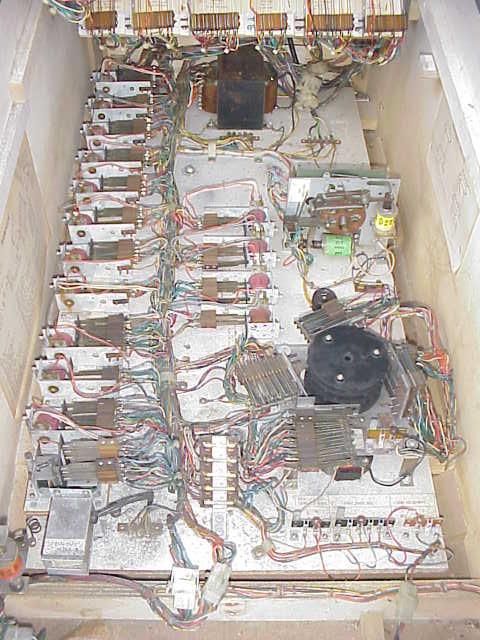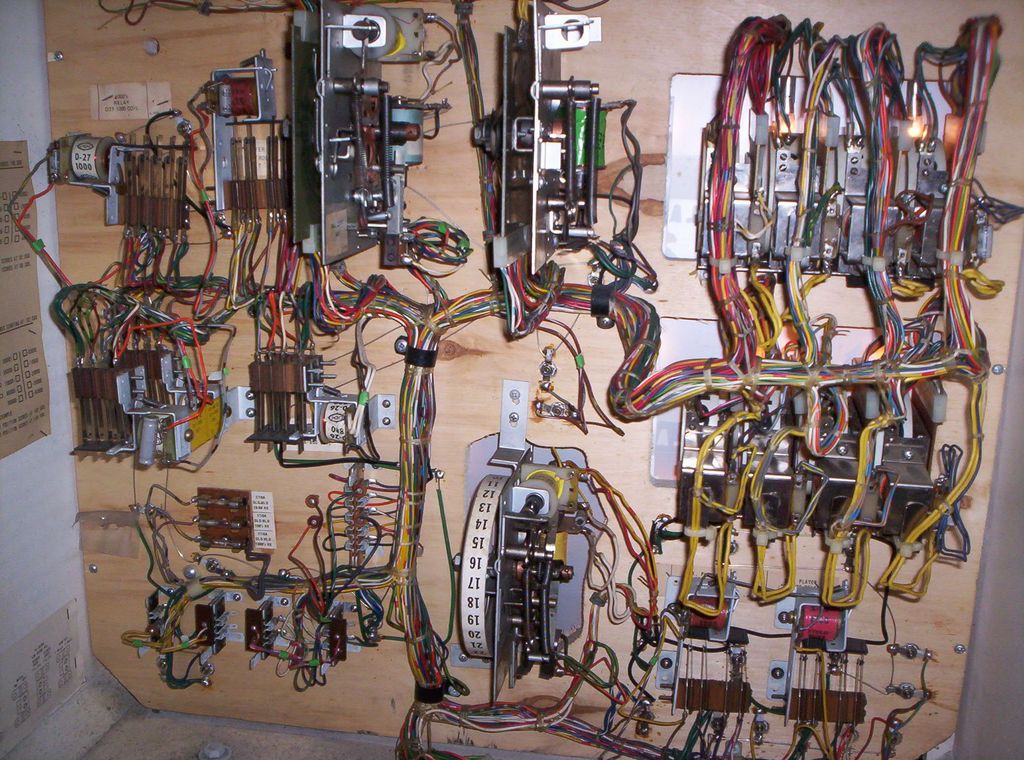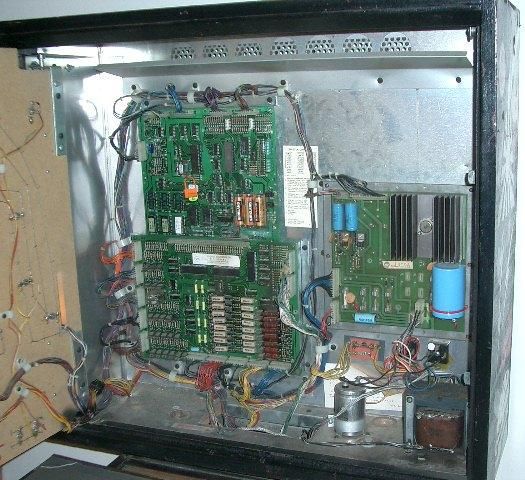Guide for First Time Pinball Buyers
Author: Wayne Eggert
Date: 01/22/12
Introduction
So you're interested in buying your first pinball machine but don't know where to start. Don't worry, you're not alone. You might not know a slingshot from a ball trough, but you don't have to! Anyone can walk up to a machine, put a coin in and immediately begin playing because of the familiar layout of the machine. You can have fun "knocking the ball around" without knowing the rules of the game. As time goes on and you learn more about the rules, you'll learn how to score higher points and will get better at aiming shots and shooting the ball at specific items. That's the great thing about pinball, it grows with your skill level and is as involved as you want it to be.
When buying your first machine there are a number of things to consider. This guide can be used to help assist you in figuring out what type of buyer you are, what kind of machine fits your budget and personality, and expectations of maintenance when owning a pinball machine. You may already know the exact title of the machine you want because you played it at an arcade or pizza shop in your youth.. or maybe you don't care what your first machine is as long as it works. There's no right or wrong answer, it all comes down to personal preference. While this guide can be used to help assist you with considerations for your first pinball machine purchase, no guide can fully substitute experience that will come quickly over time with this hobby.
Why Are You Looking For a Pinball Machine?
A good first question to ask yourself is what motivated you to look for a machine? Was it a specific machine you remember playing in a pizza shop or bar? Or did you just enjoy playing any and all pinball machines in the arcades when you had a chance? This can help you determine if you are open to any number of pinball machines or have decided you'll settle for nothing less than the *exact* name/title machine you used to play.
Age and Personality
If you're open to any machine and have no idea where to start, then there are a few personal characteristics to consider that may help narrow down your choices: age & personality. Someone in their retirement years is more likely to want a simpler playing game than someone in their 20s since those were the machines they grew up with and the game rules are often less involved. Someone in their 20s or 30s is more likely to have grown up in the arcades or playing video games and prefer fast-paced gameplay, a dot matrix display for animations, lots of ramps and heavy rule-based games. Now that's not to say there aren't also some 50 or 60 year olds that would rather a dot matrix game and 20 or 30-somethings that would rather bell chimes, but without a doubt age can play a part in a first-time pinball purchase.
Personality is another key factor -- are you a thrill seeker or more laid back? Earlier pinball machines (pre-1980) usually have simpler gameplay compared to newer machines. Conversely, pinball machines made in the mid-1980s started getting more complicated rules, moving toys on the playfield, lots of ramps and things to shoot for, often have display animations and great sound effects/music. If you thrive on speed and lots of things happening at once, you'll probably gravitate toward newer pinball machines. The older machines may seem boring to you. For some people, the newer games are overwhelming and not fun because there's too much going on. With that said, if it's your first pinball machine you may want to consider a simpler game to start off with and if you get bored with it, move onto a game with slightly more complex rules and eventually get into the heavier rule-based games. There's no right or wrong answer, it's all personal preference and what feels right.
Location, Location, Location! Oh, and Theme!
Where do you plan on putting the machine -- the garage, rec room, living room, dining room, kitchen? This is often one of the most important considerations for people. If the machine is going in a garage, it doesn't have to look pretty and might just be something for you and your buddies to play while drinking some beers. Some people refer to these types of machines as "beaters" since they're already not in pristine condition and they don't care if a drink is spilled on them, etc. If on the other hand the machine is going in the living room and will also be part of the decor in your house, then you'll probably want a nicer looking machine.
Theme is also a very important consideration for many people. Did you grow up watching a lot of Cowboy/Western movies? Where you fascinated by Science Fiction or Space? If you hated Cowboy/Western movies then you likely wouldn't want to own a pinball with that theme. Also sometimes a theme is driven by the room the machine is being placed into. A basement rec room might be perfect for just about any theme, but if you're putting the machine in your dining room or living room you might want a specific theme that would fit the room better. There are many themes like sports, cards/gambling, racing, science fiction, police/fire fighter, jungle, hero/villain, mythological, cartoony.. and also specific tv shows or movie themes like Terminator, Last Action Hero, Spiderman, TRON. No one can tell you what theme would work for you, but choosing some themes can help you narrow down what you're looking for. Some people choose to collect a group of machines of a particular theme (ie. any pinball machines that are space-themed) and decorate their game room with space-related posters and collectibles.
Electromechanical Versus Solid State
The next consideration is the type of machine you're looking for. In general most people will be choosing between two types of machines, either "electromechanical" or "solid state". Nearly all games prior to 1977 were "electromechanical" meaning there are no circuit boards in them..they operate on mechanical switches, coils and relays that all work together essentially form the "computer brains" out of mechanical parts. Electromechanical machines use rotating score reels for the displays. After 1977 most of the games are "solid state" which means they use electronic circuit boards and have digital score displays.

Picture: Inside an EM pinball cabinet. The switches, coils & relays make up the mechanical "computer".
Image courtesy of IPDB.org (John Gray).
Picture: Inside the backbox of a Chicago Coin "Stampede" (1977) Electro-mechanial Pinball
Notice the mechanical score wheels, switches and coils for the scoring. Image courtesy of IPDB.org.
Picture: Inside the backbox of a Williams Flash Pinball Machine (1979). These are all the circuit
boards that make up the game rules and replaced all the mechanical switches, relays, and coils
that made up the computer in EM machines. Image courtesy of IPDB.org (John Yates).
Picture: Digital Score displays on a Williams Flash. Image courtesy of IPDB.org (John Yates).
Electromechanical pinball machines have their own unique sound/feel when they're operating that cannot be reproduced. Usually they have a bell or chimes in them and the gameplay is often simpler than solid state games. The solid state games use circuit boards for the computer, so they are mechanically quieter in many respects.. this could be good or bad depending how much you like those sounds.
To get a better feel for an Electromechanical (EM) machine versus a Solid State machine, below are some Youtube links. The first one is an EM game (chime sounds), the second is an earlier Solid State game (electronic sounds). The third link is a newer 1990s solid state machine with *a lot* more going on. Again no right or wrong answer here, all personal preference and what you grew up with and enjoy playing.
http://www.youtube.com/watch?v=NANexdy0VTU
http://www.youtube.com/watch?v=gxFZ7IT2Vjs
http://www.youtube.com/watch?v=_LOpBLtns4M
If you're looking for a simpler machine to start out with, then you might be interested in an EM or earlier solid state machine (early 1980s on back). Games between the 1960s thru early 1980s have simpler rules and less going on mechanically than later games, but still have the fun factor there.
Your Budget
Another factor when buying your first machine is your budget. Don't expect to pay $50-$100 for a fully working machine that is ready-to-go. Sure, there are deals out there but most of the cheap machines you'll see advertised on Craigslist or eBay will be project machines or machines with issues. If you're looking for your first machine, you'll want it to be fully working or have minimal issues so you aren't immediately frustrated with it. Expect pay between $350-1000 on average for a good condition 1980s or 1990s machine. Price can vary greatly depending on the title/theme and condition of the machine. Some of the later 1990s and newer machines can cost significantly more, for example a Medievel Madness or Cactus Canyon is hard to purchase for less than $8,000 if in nice condition.
If $350 for a working machine seems high, think of it this way -- most of these machines were originally sold by the manufacturers for between $2000-4000 or more new, even back in the late 1970s. Sure they're used and no longer look like new, but much like a used car they still hold value to collectors or hobbyists. In addition, since there were limited runs of each machine made and many of the machines were destroyed by operators or parted out, the actual numbers of machines that exist is much lower than the production run. It also takes time and money to get a machine fully working, so if you're buying a fully working machine you're getting a great deal in many respects because you don't have the hassel of immediately having to figure out issues with the game. Often it can take between 20-40hrs or more for someone to shop (clean/replace non-working items) a pinball machine -- non-functioning items are fixed, lightbulbs replaced, rubber rings replaced, the playfield is cleaned/waxed. Yes there are people making some money fixing up broken machines, but it's a game of averages and some machines aren't as easy to fix as others.
Without considering what a machine should cost, first figure out how much you're comfortable spending on a single machine. Is $1000 too much? $5000? If you don't like the idea of more than $X,XXX being tied up in a game, then know that up-front and minimize price-creep. Set a budget and then look for machines in your preferred price range. You don't want to be reminded every time you walk past your machine that it took a home equity loan to purchase it. If you can only afford a few hundred dollars, then you still have a very good chance at owning a presentable machine.. it may just take some patience to find what you're looking for if you've narrowed down to a specific theme and want it to be 100% working. You can always wait on buying a machine until you have more money saved up or until the right deal comes along.
Repairing What Breaks: The Often Overlooked Consideration
There's no question about it, your machine will have things that break at some point. No, I'm not a psychic, it's just the nature of anything that has moving parts. If you buy a fully working machine, no seller can guarantee it will last X amount of years without needing any type of maintenance or service. Hopefully you're lucky and your machine lasts many years without issues.. or the problem is small enough you can diagnose/fix it yourself.
You'll have to decide how comfortable you are with fixing your own machine. The nice thing is these days there's a lot of information available on the Internet and many pinball discussion forums where you can get help with fixing your machine. The downside is, if you're not technically inclined at all or have no patience, when your machine breaks you'll either have to pony up some cash to get it fixed (generally $50/hr on up to have it serviced) or play it as-is if whatever is no longer working is minor and doesn't affect gameplay significantly.
With that said, the mechanically inclined people that can troubleshoot things usually prefer the EM machines since they can often "see what is wrong". If something isn't working, with a little time, care and common sense practically anything on an EM machine can be diagnosed and fixed. The nice thing with EM machines is it's fairly difficult to do any permanent damage to the machine if you hook up something wrong, follow free repair guides online and use some common sense. It's still entirely possible, but just harder than killing a circuit board. Some people say EM machines are more difficult to keep running since they're based on so many moving parts, but they are actually pretty reliable and if fully working, the game should work for many years in a home environment.
Solid State machines are very reliable since they are based on circuit boards and have less moving parts to fail, but they still contain many mechanical parts (switches, motors, etc). The downside with solid state machines is that if what breaks is part of the circuit boards, you can't "see" what is wrong and the circuit boards are much more difficult to diagnose without some electronic know-how. Often it is best to leave repair up to a professional if you've never worked on circuit boards before and don't have the patience for that sort of thing. Sometimes it's more cost-effective to buy replacement circuit boards after narrowing down the problematic board. Replacement pinball boards generally average about $100-200 but can vary depending on which board is faulty.
Comments:
No comments have yet been made.
